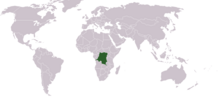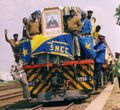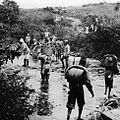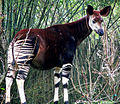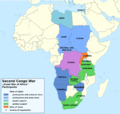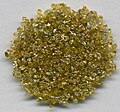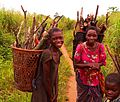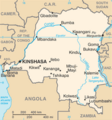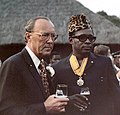Portal:Democratic Republic of the Congo
The Democratic Republic of the Congo Portal
The Democratic Republic of the Congo is a country in Central Africa. By land area, the DRC is the second-largest country in Africa and the 11th-largest in the world. With a population of around 112 million, the Democratic Republic of the Congo is the most populous Francophone country in the world. The national capital and largest city is Kinshasa, which is also the economic center. The country is bordered by the Republic of the Congo, Central African Republic, South Sudan, Uganda, Rwanda, Burundi, Tanzania (across Lake Tanganyika), Zambia, Angola, the Cabinda exclave of Angola, and the South Atlantic Ocean. Centered on the Congo Basin, the territory of the DRC was first inhabited by Central African foragers around 90,000 years ago and was reached by the Bantu expansion about 3,000 years ago. In the west, the Kingdom of Kongo ruled around the mouth of the Congo River from the 14th to 19th centuries. In the northeast, center, and east, the kingdoms of Azande, Luba, and Lunda ruled from the 16th and 17th centuries to the 19th century. King Leopold II of Belgium formally acquired rights to the Congo territory from the colonial nations of Europe in 1885 and declared the land his private property, naming it the Congo Free State. From 1885 to 1908, his colonial military forced the local population to produce rubber and committed widespread atrocities. In 1908, Leopold ceded the territory, which thus became a Belgian colony. Congo achieved independence from Belgium on 30 June 1960 and was immediately confronted by a series of secessionist movements, the assassination of Prime Minister Patrice Lumumba, and the seizure of power by Mobutu Sese Seko in a 1965 coup d'état. Mobutu renamed the country Zaire in 1971 and imposed a harsh personalist dictatorship until his overthrow in 1997 by the First Congo War. The country then had its name changed back and was confronted by the Second Congo War from 1998 to 2003, which resulted in the deaths of 5.4 million people. The war ended under President Joseph Kabila, who governed the country from 2001 to 2019, under whom human rights in the country remained poor and included frequent abuses such as forced disappearances, torture, arbitrary imprisonment and restrictions on civil liberties. Following the 2018 general election, in the country's first peaceful transition of power since independence, Kabila was succeeded as president by Félix Tshisekedi, who has served as president since. Since 2015, the Eastern DR Congo has been the site of an ongoing military conflict in Kivu. The Democratic Republic of the Congo is extremely rich in natural resources but has suffered from political instability, a lack of infrastructure, corruption, and centuries of both commercial and colonial extraction and exploitation, followed by more than 60 years of independence, with little widespread development. Besides the capital Kinshasa, the two next largest cities, Lubumbashi and Mbuji-Mayi, are both mining communities. The DRC's largest export is raw minerals, with China accepting over 50% of its exports in 2019. In 2021, DR Congo's level of human development was ranked 179th out of 191 countries by the Human Development Index and is classed as a least developed country by the UN. , following two decades of various civil wars and continued internal conflicts, around 600,000 Congolese refugees were still living in neighbouring countries. Two million children risk starvation, and the fighting has displaced 4.5 million people. The country is a member of the United Nations, Non-Aligned Movement, African Union, COMESA, Southern African Development Community, Organisation Internationale de la Francophonie, and Economic Community of Central African States. (Full article...) Selected article - The Congo Basin (French: Bassin du Congo) is the sedimentary basin of the Congo River. The Congo Basin is located in Central Africa, in a region known as west equatorial Africa. The Congo Basin region is sometimes known simply as the Congo. It contains some of the largest tropical rainforests in the world and is an important source of water used in agriculture and energy generation. The rainforest in the Congo Basin is the largest rainforest in Africa and second only to the Amazon rainforest in size, with 300 million hectares compared to the 800 million hectares in the Amazon. Because of its size and diversity the basin's forest is important for mitigating climate change in its role as a carbon sink. However, deforestation and degradation of the ecology by the impacts of climate change may increase stress on the forest ecosystem, in turn making the hydrology of the basin more variable. A 2012 study found that the variability in precipitation caused by climate change will negatively affect economic activity in the basin. (Full article...)General images -The following are images from various Democratic Republic of the Congo-related articles on Wikipedia.
This is a Good article, an article that meets a core set of high editorial standards.
Barthélemy Mukenge Nsumpi Shabantu (3 August 1925 – 4 July 2018) was a Congolese politician who served as President of Kasaï Province from 11 June 1960 to January 1962 and July to September 1962. He was a president of the Association des Lulua-Frères, a Lulua ethnic syndicate, and a leading member of the Union National Congolaise. Though initially allied with nationalist Patrice Lumumba, he later denounced him and aligned himself with more moderate politicians. Following the division of Kasai Province in late 1962, Mukenge became Minister of Health and Minister of Social Affairs of the new Luluabourg Province. He later served as Governor of Kivu Province and on the Political Bureau of the Mouvement Populaire de la Révolution. He withdrew from politics in 1974 and died in 2018. (Full article...) This is a Featured article, which represents some of the best content on English Wikipedia..
Tintin in the Congo (French: Tintin au Congo; French pronunciation: [tɛ̃tɛ̃ o kɔ̃go]) is the second volume of The Adventures of Tintin, the comics series by Belgian comic strip artist Hergé. Commissioned by the conservative Belgian newspaper Le Vingtième Siècle for its children's supplement Le Petit Vingtième, it was serialised weekly from May 1930 to June 1931 before being published in a collected volume by Éditions de Petit Vingtième in 1931. The story tells of young Belgian reporter Tintin and his dog Snowy, who are sent to the Belgian Congo to report on events in the country. Amid various encounters with the native Congolese people and wild animals, Tintin unearths a criminal diamond smuggling operation run by the American gangster Al Capone. Following on from Tintin in the Land of the Soviets and bolstered by publicity stunts, Tintin in the Congo was a commercial success within Belgium and was also serialised in France. Hergé continued The Adventures of Tintin with Tintin in America in 1932, and the series subsequently became a defining part of the Franco-Belgian comics tradition. In 1946, Hergé re-drew and coloured Tintin in the Congo in his distinctive ligne-claire style for republication by Casterman, with further alterations made at the request of his Scandinavian publisher for a 1975 edition. (Full article...)
WikiProjectsTopicsCategoriesRelated portalsAssociated WikimediaThe following Wikimedia Foundation sister projects provide more on this subject:
Discover Wikipedia using portals | ||||||



